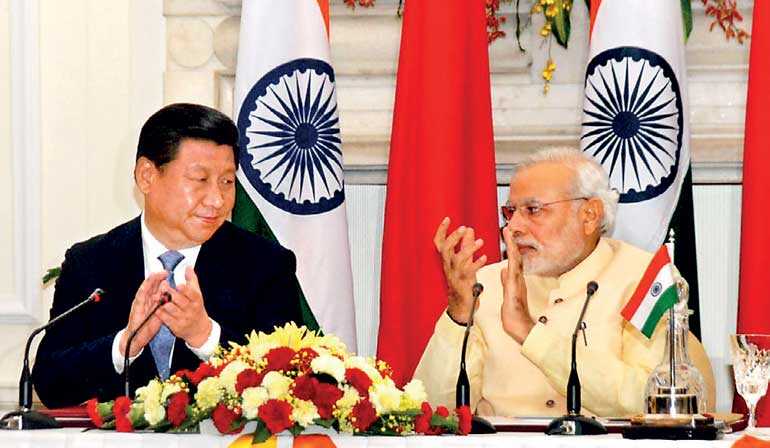Thursday Feb 19, 2026
Thursday Feb 19, 2026
Tuesday, 24 April 2018 00:00 - - {{hitsCtrl.values.hits}}

By Sanjay Kapoor
www.hardnewsmedia.com: In the past few months there have been ample indications that New Delhi is keen to restore its broken ties with China.
It has realised to its mortification that post the Doklam face-off, India has not really benefited from the confrontation save for getting some applause for showing spine in the face of Chinese expansion. It has found its influence in South Asia getting compromised by a determined Chinese onslaught. Like nine pins, one country after another in the SAARC region is falling to the Chinese charm.
Nepal, Sri Lanka, the Maldives and even Bangladesh have seen wisdom in forging closer ties with China and seeking its investment in many connectivity projects.
Despite repeating ad nauseam that Chinese investments in small countries could undermine their sovereignty, New Delhi has failed to impress its awestruck neighbours. Sri Lanka preferred to give away its Hambantota port trust on a 99-year-lease after defaulting on the payment of a hefty loan rather than cancelling the project.
In the Maldives, President Abdulla Yameen Abdul Gayoom prefers to work with the Chinese, who do not pontificate about the democracy deficit in his country, rather than give meaning to ‘India First’. China has discouraged India and other countries from trying to intervene in the Maldives and, despite the righteous indignation expressed by India and the West, Yameen is hanging in there. In these circumstances, it was considered wise by the Indian Government to reach out to China and see whether conversation could begin again. India did its bit to prepare the ground for these talks.
First, it worked closely with Beijing to symbolically punish Pakistan on the issue of funding terror by putting it on the FATF grey list. This was a big blow to Islamabad as it leaned on Beijing’s support to stonewall any attempt by India or Western nations to declare it a terror state or terror-funder.
India also helped China become vice-president of FATF. Along with this, India responded to China’s sensitivities regarding Tibet and the Dalai Lama. For nearly 60 years, India has been providing refuge to the Tibetan Buddhist community. The Chinese view the Dalai Lama and his movement as ‘splittist’ and have been demanding they not be extended privileges by the Indian State. New Delhi has largely avoided these suggestions, but it seems it is now responding to them.
Strangely, Indian Foreign Secretary Vijay Gokhale wrote a mail to all government departments to stay away from the Tibetan Buddhist celebrations commemorating the journey of the Dalai Lama to India in 1959. Gokhale’s letter tells government officials that, as India-China ties are at a crucial juncture, it would be prudent to stay away from the exiled community.
The decision has shocked many who are viewing it as politically immoral as it jettisons not just a strategic asset, but also lowers the image of a spiritual leader who has huge followings in India and other countries. It also shows to the world that India succumbs to pressure. The Tibetan Buddhist community has been in a dilemma for some time.
It has been wooed by the Chinese Government to return to its homeland. Beijing is using many of the returnees to convey to the latter’s relatives and friends in India that is safe to return to Lhasa as China is no longer being vindictive.
The Dalai Lama sent his envoy last year on a secret mission, fuelling rumours that he himself might return to Tibet. This premise is very premature, as it does not suggest what the Dalai Lama would get from the Chinese if he decides to make the move back home. Similar questions have been raised about India, too!
What would India get by giving up the Dalal Lama or trying to draw close to China? Will China lessen its territorial ambitions cloaked in the enlargement of its much vaunted Belt and Road Initiative? Are we compelled to go soft on China as we have no clue as to which way Trump’s US will turn? Or have we at all realised that we are being provoked by the West to fight with China and it’s not in our national interest to do that?
(The writer is Editor of Delhi’s Hardnews magazine and author of ‘Bad Money Bad Politics – The untold story of Hawala scandal’.)